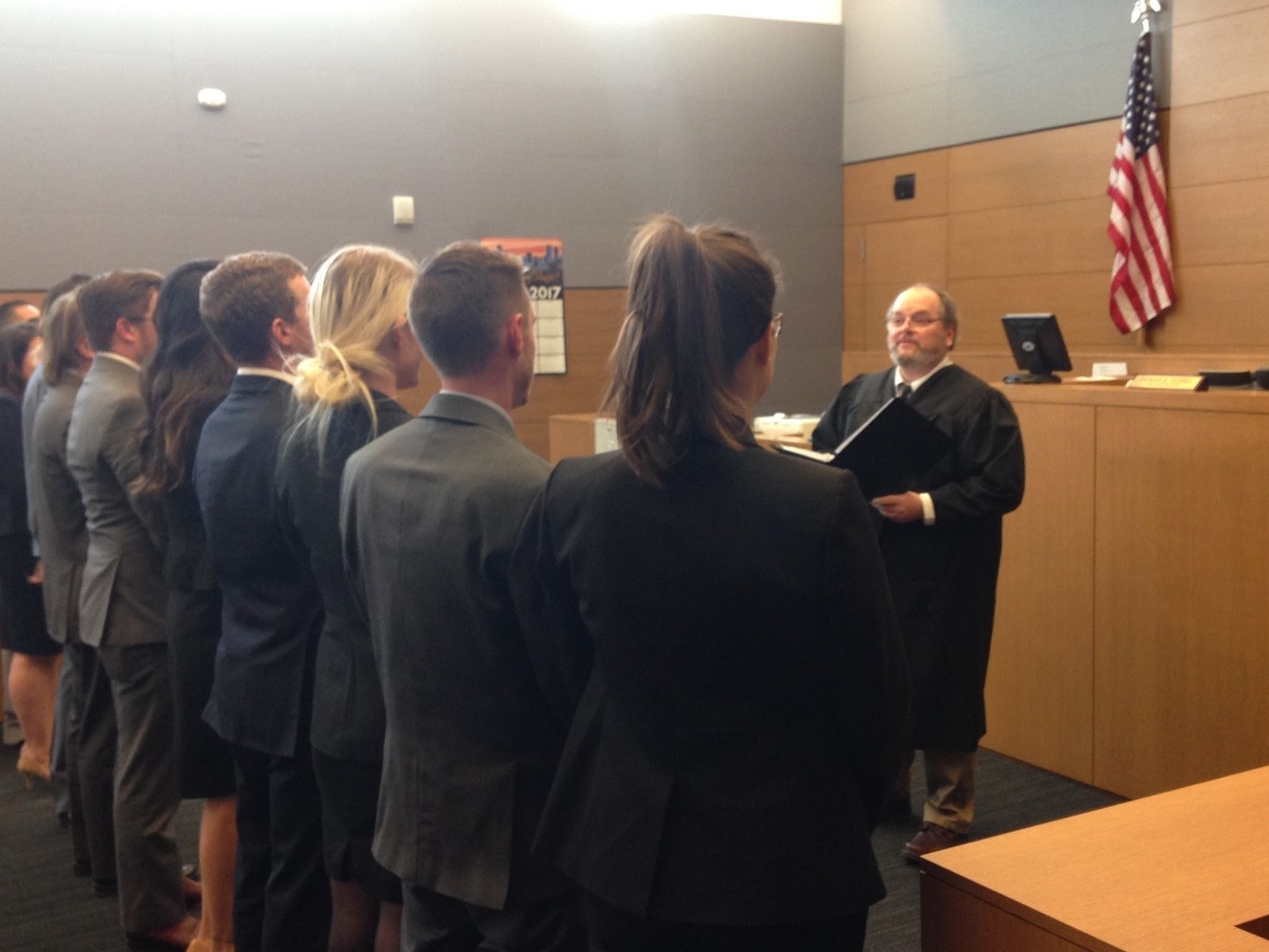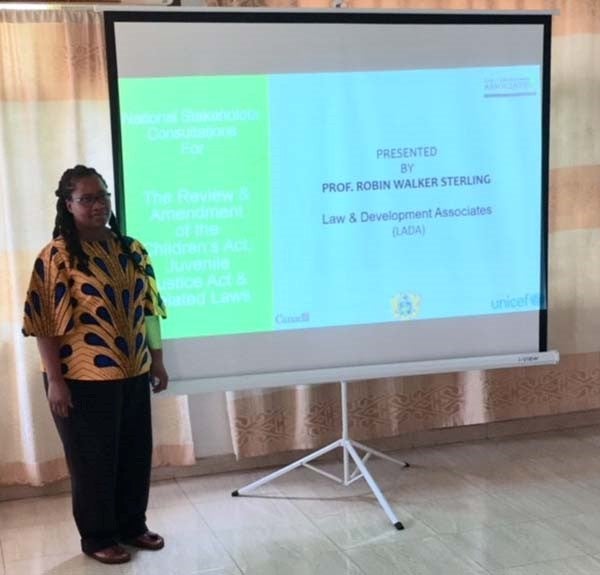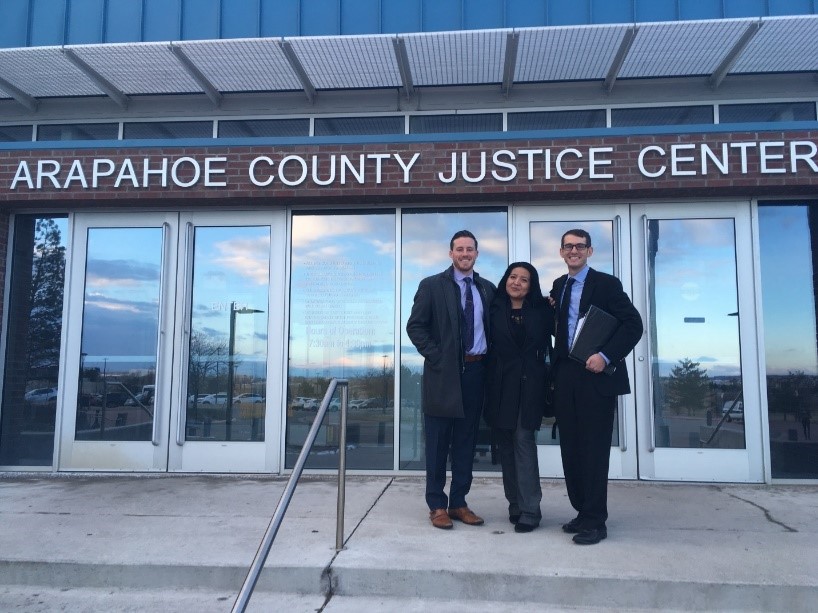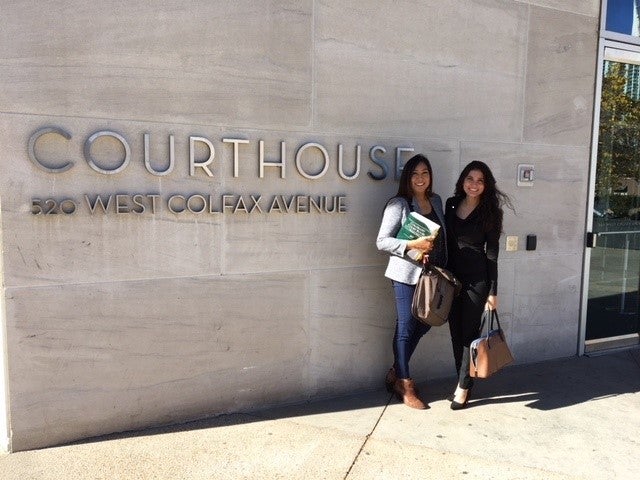Criminal Defense Clinic Spring 2018 Updates
CDC student attorneys at the spring 2018 swearing-in ceremony with Denver Magistrate Judge James Zobel (r).
The 2017-18 academic year has been an exciting one in the Criminal Defense Clinic (CDC). With Professor Robin Walker Sterling on a year-long Fulbright in Ghana, and Associate Professor Lasch having been on sabbatical in the Fall 2017 term, the CDC students and clients were in the most capable hands of Assistant Professor Lindsey Webb and Clinical Fellow Rachel Moran. The CDC is eternally grateful to them, for they carried the torch without missing a step.
After graduating from Denver Law’s Clinical Fellowship LLM program, Moran will leave her position as the CDC clinical teaching fellow to start a tenure-track position at the University of St. Thomas School of Law, where she will be creating her own criminal and juvenile defense clinic. We wish her well and look forward to seeing the fruits of her labors—though she will be sorely missed here.
Robin Walker Sterling presenting at Takoradi in Ghana
Professor Walker Sterling has continued her work as a consultant for the Children's Act Revision Project of the Ministry of Gender, Children, and Social Welfare and the United Nations International Children's Emergency Fund (UNICEF). Part of a consultant team from Law and Development Associates, Professor Walker Sterling has worked with the team and representatives from UNICEF to complete consultations with juvenile justice stakeholders in regions around the country. At each two-day consultation, Professor Walker Sterling presented a comprehensive review of the laws and international treaties affecting children in Ghana across several areas of law, including delinquency, dependency, adoption, foster care, child labor, and criminal law, and education. After the presentation, Professor Walker Sterling helped to facilitate discussion among juvenile justice stakeholders from all of these areas to find out what parts of the law were working for the stakeholders, and what parts were not.
With feedback from the people who work in the system, the team is now writing a series of position papers, including on the use of corporal punishment in the home, and on the age of sexual consent. Professor Walker Sterling is co-authoring these position papers.
Once the position papers are done, the team will work to translate the information it has collected over the last year into legislation. The drafting process is expected to take the entire summer. The updated, comprehensive Children's Act is expected to be introduced in Parliament after members resume session in the fall.
As a Fulbright Scholar, Professor Walker Sterling has also had teaching duties at the University of Ghana School of Law. While at UG she has co-taught Gender and the Law; has taught a graduate-level seminar on Juvenile Justice in Ghana and the United States; and has presented a guest lecture in the Conflict of Laws course.
Our CDC students have been, as is their custom, habitually providing excellent representation to our clients, who would otherwise go without counsel. In four trials so far this year, three ended in complete acquittal. And many other cases have simply been dismissed by prosecutors not willing to proceed to trial against the CDC.
CDC students (l-r) William Doyle Bode, Maria Barco and Taylor Feero outside court after a jury trial at the Arapahoe County Courthouse in which their client was found not guilty on all charges.
CDC student attorneys (l-r) Felicia Acosta-Steiner and Jessica Cordero after a court appearance in Denver General Sessions.
Felicia Acosta-Steiner, a 3L student in the University of Denver Sturm College of Law Criminal Defense Clinic (CDC), says that a quote from Dr. Martin Luther King, Jr. “encompasses why our work in the CDC, and as future ‘justice warriors,’ is our responsibility to the legal profession.” In his Letter from Birmingham City Jail, Dr. King wrote “Injustice anywhere is a threat to justice everywhere. We are caught in an inescapable network of mutuality, tied in a single garment of destiny. Whatever affects one directly, affects all indirectly.”
“The CDC is THE reason I came to Denver Law,” says Jessica Cordero, 3L. “Through this experiential program, I had an opportunity to apply what I was learning in my doctrinal classes while being simultaneously challenged to do my best work. The CDC allowed me to build the foundation for the lawyer I will become and I am forever grateful for the experiences I shared with co-counsel and clients as well as the lessons learned throughout my time there.”






